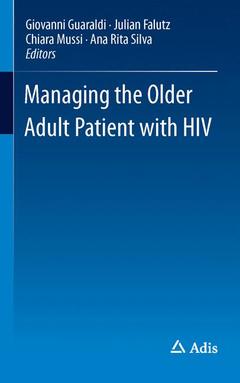Description
Managing the Older Adult Patient with HIV, 1st ed. 2016
Coordinators: Guaraldi Giovanni, Falutz Julian, Mussi Chiara, Silva Ana Rita
Language: English
Subject for Managing the Older Adult Patient with HIV:
227 p. · 12.7x20.3 cm · Paperback
Description
/li>Contents
/li>Biography
/li>Comment
/li>
1. Introduction
References
2. Pathophysiology of HIV/AIDS
Key points
2.1 Immunodeficiency, immune activation, and chronic inflammation
2.2 HIV and immunosenescence
2.3 Evolving clinical profile
References
3. HIV associated non-AIDS conditions in patients aging with HIV
Key points
3.1 HIV-associated non-AIDS conditions versus comorbidities
References
4. Comorbid conditions and older adults with HIV
Key points
4.1 Multimorbidity4.2 Accentuated versus accelerated aging
4.3 Aging versus aged
References
5. Frailty in HIV
Key points
5.1 Defining frailty
5.2 Measuring frailty
5.3 The utility of measuring frailty
5.4 Frailty in the context of HIV
References
6. Disability
Key points
6.1 Overview
6.2 Functional impairment and disability in patients with HIV
6.3 Tools to measure disability
6.4 ConclusionReferences
7. Geriatric syndromes
Key points
7.1 Definition
7.2 Falls
7.3. Delirium
7.4 Conclusion
References
8. HIV prevention and screening in older adults
Key points
8.1 Age-related risk factors
8.2. Barriers to prevention
8.3. Screening and counselling opportunities
References
9. Multidimensional geriatric assessment in older patients with HIV
Key pointsReferences
10. Antiretroviral treatment in older patients
Key points
10.1 When to start antiretroviral therapy
10.2 What to start
10.3 What to change
10.4 Future perspectives
References
11. HIV, aging, and polypharmacy
Key points
References
12. Nutrition and physical exercise in older patients with HIV
Key points
12.1 Overview
12.2 Assessment of risk of malnutrition
12.3 Intervention12.4 Sarcopenic obesity
12.5 Physical exercise
12.6 Conclusion
References
13. Smoking cessation in patients with HIV
Key points
13.1 Pharmacological strategies to treat nicotine dependence
References
14. Self-management
Key points
References
Giovanni Guaraldi, MD, is Assistant Professor of Infectious disease at University of Modena and Reggio Emilia, Italy, where he also completed his medical training. Dr Guaraldi undertook his residency at Liverpool School of Tropical Medicine, UK, and Jackson Memorial Hospital, USA.
Dr Guaraldi was awarded the Dean's Delegate Cooperation for development projects of Modena University. He has extensive experience in HIV in resource limited countries and has coordinated the European Africa, Caribbean, Pacific project CoBaSys (Community Based System in HIV Treatment) focused on antiretroviral access programs in sub-Saharan African countries.
In 2002 Dr Guaraldi started a liver and kidney transplant program for people with HIV at the multivisceral transplant centre at Policlinico of Modena, Italy. Since the centre opened he has personally cared for approximately 80 patients with HIV who have received solid organ transplantation. Dr Guaraldi has lead the Modena HIV Metabolic Clinic since 2000. This referral centre cares for more than 4000 patients and offers a multidisciplinary team consisting of infectious disease physicians, nutritionists, occupational therapists, psychologists, cardiologists, nephrologists, endocrinologists, and plastic surgeons for the diagnosis and treatment of non-infectious comorbidities.
Dr Guaraldi has been the principal investigator in several studies generated by the MHMC, mainly focused on frailty and HIV associated comorbidities. He has extensive experience in scientific publication, with more than 260 peer reviewed papers, he is co-editor of Journal of Antimicrobial Chemotherapy, serves as reviewer for the major HIV journals, and as a consultant for EMA. He supervises PhD student in the Experimental Medicine PhD course at Modena University.
Dr Guaraldi is a panel member of the European AIDS Clinical Society guidelines on prevention and management of HIV associated comorbidities and has published widely
A concise, practical handbook on the care of older patients with HIV, covering the pathophysiology, diagnosis, treatment, and comorbidities associated with this disease
Reviews the current treatment guidelines and recommendations for management of HIV in this subset of patients, and discusses the emerging treatments suitable for comorbid patients
Easily accessible text, tables, and images provide readers with a fast synopsis of key studies and available treatment options




